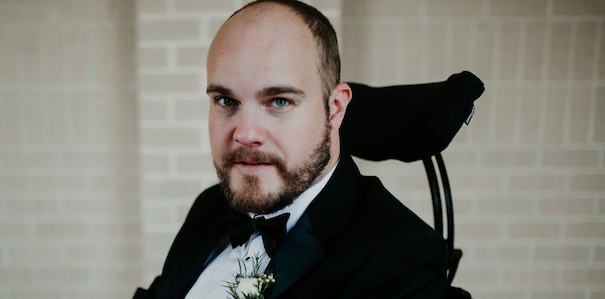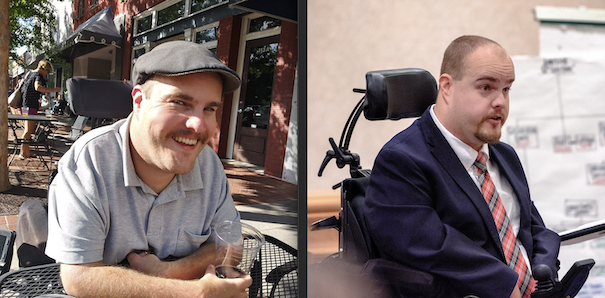Matthew P. Cavedon joins CSLR as Robert Pool Fellow
By CSLR | Emory Law | Aug 16, 2022 7:08:00 AM

CSLR Welcomes Matthew P. Cavedon for Three-Year Robert Pool Fellowship
On August 15th, the Center for the Study of Law and Religion welcomed Matthew P. Cavedon to Emory's campus as he began a three-year Robert Pool Fellowship. Cavedon, a native of Connecticut, first came to CSLR after graduating from Harvard College. He received his JD/MTS from Emory in 2015, having served as Executive Articles Editor of the Emory International Law Review. While at CSLR, he served on the team that won an international law and religion moot court competition, held in Venice, Italy. Following graduation, he worked as a Constitutional Fellow at the Institute for Justice in Arlington, Virginia. He assisted with constitutional litigation, especially in cases involving civil forfeiture. He then clerked for the Hon. Lisa Godbey Wood of the U.S. District Court for the Southern District of Georgia in Brunswick, Georgia. Following this, Cavedon served as an assistant public defender in Gainesville and Dawsonville, Georgia. He worked as a trial, appellate, and juvenile attorney on cases ranging from truancy to murder. Right before returning to CSLR, Cavedon clerked for the Hon. Nels S. D. Peterson of the Supreme Court of Georgia.
As CSLR Faculty Director John Witte, Jr. describes: "Matthew Cavedon came to Emory from Harvard as a strong JD/MTS candidate and quickly demonstrated his scholarly excellence, rhetorical and analytical skills, and deep commitment to building an excellent academic community within the Center and the Law School. We admire his meteoric professional rise after law school, commitment to providing high quality criminal defense, recent clerkship, and efforts to retain and build strong new ties to church, family, and academy. We are grateful for his service as an ambassador in the broader world of law and religion. And delighted that CSLR can now help him pivot and integrate his work as he prepares for a distinguished academic career."
This new Fellowship is designed to give scholars the time, space, colleagues, and platform to prepare and publish new scholarship in the broad fields of law and religion, as well as providing high-level teaching experience in preparation for further leadership in the legal profession and academy. Scholarship will be a principal focus in the first year of the Pool Fellowship, with teaching beginning in the second semester. Cavedon's scholarship will range widely from short op-eds, interviews, and Canopy Forum articles, to scholarly law review articles and academic book chapters. This work will undoubtedly be of great interest to the law and religion community and will be shared widely with the broader public. The Pool Fellowship has been made possible by a generous gift from the McDonald Agape Foundation to be used to support the work.
We sat down with Matt to learn more about his path (back) to Emory and plans for the future.
Welcome back to CSLR! Since 2015, you have held an impressive array of legal positions, including your recent tenure as a law clerk at the Supreme Court of Georgia. What made CSLR the right place for the next phase of your career? How does this professional experience inform your academic scholarship?
It’s great to be back in this community, which was my home at Emory and has continued to be such a solid support throughout my career. I have always admired “academic-practitioners” – people who have one foot in the scholarly and one in the practical world. They let critical thinking and realities on the ground inform each other in really creative ways. I think I have enough real-world experience to benefit from time to meditate more deeply on what Prof. Witte has called the “weightier things of the law.” And there’s no better place to do that than CSLR. I look forward to bringing my courtroom experiences into conversation with the rich historical, philosophical, and theological currents that flow through CSLR.
As part of the Robert Pool Fellowship, you will begin teaching at the Law School during your second semester (Spring 2023). Is there a particular course (or courses) you are hoping to teach? What will it be like returning to the classroom?
My first teaching assignment will be Legal Issues in Family Violence. I plan to draw on pop culture, the news, and practice experiences I’ve had to give students a sense of what dynamics can play out in real cases. Looking to the next several years, I hope I can teach more criminal-related courses and several rooted in the natural law tradition and Catholic social teaching. As far as returning to the classroom goes, my main goals are to listen as much as I talk (but by golly, I, like most lawyers, do love to hear myself talk), foster honest exchanges about tough topics, and teach broadly without assigning encyclopedia-length syllabi!
What are three books [scholars / traditions] that have shaped your intellectual development?
- The Thomist tradition, especially as interpreted by the Renaissance Spanish Jesuit Francisco Suarez, is foundational for my thinking about the public order. I consider its ideas of freedom and limited government to have much a stronger foundation than the Lockean tradition with which most Americans are more familiar.
- Relatedly, I have a deep affection for Edmund Burke, Friedrich Hayek, James C. Scott, Ron Paul, and others who promote local context and ordered liberty.
- Jurisprudentially, US Justices Scalia and Gorsuch, and Georgia’s Justice Peterson, have taught me much about the importance of deep-dive originalism and careful textualism in our constitutional republic.

You're joining CSLR on the eve of its fortieth anniversary. From your perspective, why is the study of law and religion important today? What are some of the challenges we can expect to face in the next forty years?
People are deeply concerned about the role of justice in law right now. Some demand that law secure all justice, or pursue it directly without regard for rules. Others are so focused on rules that they find it difficult to articulate why rules have true value. Thinking about higher-order principles undergirding law doesn’t only happen in religion. But religion is one of the two paradigms – together with final irreligion – for inquiry regarding the absolute first principles of law. As Aristotle noted, law is a subspecies of ethics. Ethics depends on anthropology – on an understanding of the human person and human society. And in the last analysis, anthropology hinges on questions of humanity’s origins, ends, and evaluation – that is, on concerns belonging to theology. Religion will always be important for law because it is where we wrestle with law’s essence. We cannot coherently address the defining issues of dignity, freedom, and responsibility without reference to religion (or an ultimate alternative to it).
The great challenge of the day is that the ever-increasing specialization of law masks those ultimate foundations in a thick cloak of mundane details. People know in their hearts of hearts that law has to be about more than just which grammatical rule to apply to resolve some ambiguous punctuation in subsection 9.4(c) of regulation XYZ. But it takes constant struggle to be able to situate each bit of law in a context that makes moral and social sense. CSLR’s task should be to constantly push upwards and outwards from the nitty-gritty toward law’s fundamental orienting concerns. Even if it’s dangerously easy to get a job in Big Law or federal office without paying the weightier things much heed.

